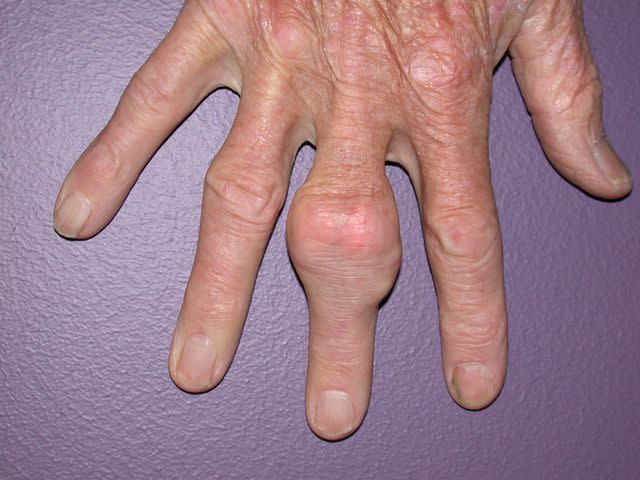Nutrition and Supplements for Gout Relief
Medically reviewed by Elizabeth Barnes, RDN
Although gout isn't curable, it is highly treatable. Lifestyle modifications are often recommended as a part of a gout treatment plan. Certain supplements for gout may also be able to help.
Gout is a type of systemic inflammatory arthritis. It is characterized by periods of painful flares followed by remission. Typically, gout affects one joint at a time.
Gout is caused by high levels of serum uric acid, otherwise known as hyperuricemia. Certain conditions, medications, or your diet may cause high uric acid levels.
This article will focus on nutrition and dietary supplements for gout management. It will cover various vitamins, minerals, and herbs that may treat gout, as well as those that may make the condition worse.

Getty Images / The Good Brigade
Nutrition & Gout
Nutrition plays a crucial role in the development and management of gout.
Research suggests that an overall well-balanced diet may reduce the risk of gout. Certain nutrients, like vitamins, minerals, fiber, and unsaturated fats are highly recommended for gout prevention.
A diet high in purines, however, may increase your risk of gout or make gout symptoms worse. Purines are substances found both naturally in the body and in certain foods. In the body, purines are broken down into uric acid, which can cause gout if levels become too high.
Although a purine-rich diet doesn't always lead to gout, it does increase the risk. Purines are abundant in red meats, organ meats, and certain types of seafood.
Additionally, a diet high in a type of sugar called fructose may increase your chance of getting gout. This is because your body breaks fructose down into purines. Fructose is naturally found in fruits. It is also added to high-fructose corn syrup.
If you're diagnosed with gout, it's important to avoid foods and nutrients that may induce flare-ups. It's also important to include nutrients that may lower levels of purines and uric acid.
There is evidence to suggest that diets high in vitamins and minerals from fruits, vegetables, whole grains, and plant-based proteins may keep uric acid levels at bay and, thus, reduce the risk of gout.
Related: How to Follow a Gout Diet
Who Should Take Supplements for Gout?
Takeaway
Supplement use should be individualized and vetted by a healthcare professional, such as a registered dietitian (RD), pharmacist, or healthcare provider. No supplement is intended to treat, cure, or prevent disease.
Some people may benefit from taking dietary supplements for gout. While research is still emerging, certain supplements may help alleviate gout symptoms and/or prevent flare-ups.
Nutrient deficiencies are not known to cause gout. However, there is some suspicion that people with gout may be more likely to have low levels of both vitamin D and vitamin B12.
Low levels of these and other nutrients may be due to dietary choices or to health conditions often associated with gout.
Gout supplements may be most helpful to those with the condition or known nutrient deficiencies that should be corrected.
The following sections provide an overview of the scientific research behind various supplements for gout.
Fish Oil
Fish oil is a source of omega-3 fatty acids, which are essential polyunsaturated fats that are important to various aspects of health.
In a small pilot study, 40 people with gout were randomized to receive either 6.2 grams (g) of daily fish oil or nothing for 24 weeks. The study results showed no significant changes in uric acid levels among those who took fish oil supplements.
In an observational study, high consumption of omega-3 fatty acid–rich fish was associated with fewer gout flares. However, taking fish oil supplements alone was not shown to decrease gout flares.
As can be seen, current research doesn't support using fish oil supplements for gout. However, there may be benefits to consuming foods that contain omega-3 fatty acids, such as fatty fish, flaxseed, walnuts, and certain plant oils.
Overall, more research is needed in this area.

DermNet / CC BY-NC-ND
Acute gout tophiMethylsulfonylmethane (MSM)
Methylsulfonylmethane (MSM) is a sulfur-containing chemical found in humans as well as certain plants and animals.
MSM is commonly used in supplement form for its antioxidant and anti-inflammatory properties.
In human research, MSM has been found to reduce uric acid levels. However, much of the research has been carried out on athletes rather than people with gout.
Other studies have shown that MSM supplementation reduces pain and inflammation in osteoarthritis, another form of arthritis. MSM has not been investigated regarding its effects on gout.
Aside from most anecdotal evidence, more scientific evidence is needed on MSM for gout.
Folic Acid
A diet that is rich in folic acid (a B vitamin) may reduce uric acid levels and prevent gout, at least according to some research.
Data from the National Health and Nutrition Examination Survey (NHANES) revealed that men with higher intakes of folic acid and folate (another form of vitamin B9) had lower instances of hyperuricemia. In females, a higher intake of folate and not folic acid was found to reduce hyperuricemia risk.
However, there is limited research on the direct effect of folic acid on gout.
Folate and folic acid are available in mostly plant-based foods like spinach, legumes, grains, and avocados.
Vitamin C
Due to its antioxidant properties, vitamin C (found in bell peppers, citrus, broccoli, strawberries, and other produce) has been studied as a potential treatment option for gout.
According to one literature review, several studies have shown an inverse relationship between vitamin C intake (food or supplements) and uric acid levels. In other words, high serum vitamin C levels tend to be associated with low serum uric acid levels.
A meta-analysis of studies on vitamin C supplementation for gout also found promising results. Per the meta-analysis, vitamin C supplementation may reduce serum uric acid and, thus, the risk of gout. These results were most significant in those younger than 65 years old.
Vitamin D
Vitamin D from supplements or foods may be beneficial for gout prevention and management. Vitamin D can be found in foods like dairy, certain fish, mushrooms, and fortified foods.
Based on information from the NHANES, researchers reported that vitamin D consumption may decrease uric acid levels in males and females. While males were shown to have benefited from both food and supplement sources of vitamin D, females only benefited from food sources.
A small study on the effects of vitamin D supplementation on uric acid found more promising results. In the study, 71 adults with prediabetes (people with blood sugar levels not quite high enough to be considered type 2 diabetes) were given either vitamin D2, vitamin D3, or nothing for 12 weeks. Those who used either form of vitamin D experienced decreased uric acid levels.
Stronger studies should be conducted to determine if vitamin D plays a role in gout.
Vitamin B12
Vitamin B12 performs many important functions in the body and can be found in many animal-based foods and fortified foods.
Some research shows that people with gout may be more likely to be deficient in vitamin B12.
Vitamin B12 levels were found to be inversely related to uric acid levels in an NHANES study on B vitamins. Per the study, however, vitamin B12 intake was only associated with lower levels of serum uric acid in males and not females.
Few other studies exist on vitamin B12 and gout.
What Vitamins to Avoid With Gout
Some vitamins and other nutrients may make gout worse.
Niacin, also known as vitamin B3, is found in foods and supplements and may increase uric acid levels and make gout worse.
Healthcare professionals sometimes prescribe niacin for certain health conditions, like heart disease. However, there is some evidence that niacin may inhibit an enzyme that acts on uric acid, which may lead to uric acid build-up.
Nicotinic acid, a derivative of niacin, has also been found to increase uric acid levels and even induce gout. These effects have been seen with varying doses of nicotinic acid.
Another vitamin to be careful of is vitamin A.
Although evidence isn't solid, it's thought that vitamin A may also increase uric acid levels, which could cause gout or make symptoms worse. According to one NHANES, people with high serum vitamin A were more likely to have hyperuricemia than those with low serum vitamin A.
While more research is needed to confirm the effects of niacin and vitamin A on gout, it's best to talk with a healthcare professional about these vitamins if you have gout.
Herbs for Gout
You may consider herbs instead of dietary supplements when it comes to treating your gout.
While dietary supplements typically contain vitamins, minerals, and other nutrients, herbal supplements contain herbs from plants. Herbs are often used as complementary or alternative treatments for health conditions like gout, most commonly in traditional Chinese medicine (TCM).
Various herbs for gout have been studied for their potential roles in gout treatment or prevention. Study results are mixed, however, and research is still emerging.
Herbs that have been studied for their use in gout include:
These and other herbs can be found in various forms, including teas, capsules, and tinctures.
Be sure to check with a healthcare provider before using herbs for gout. Many herbs interact with medications or other supplements and may not be safe for everyone.
Summary
Gout is a type of inflammatory arthritis that occurs when uric acid levels are too high in the body. Some supplements for gout may reduce symptoms and prevent flare-ups. Many gout supplements contain vitamins and minerals, but other nutrients or herbs may also provide benefits.
If you're interested in taking supplements or herbs for gout, talk with a healthcare provider to learn more.
Read the original article on Verywell Health.

